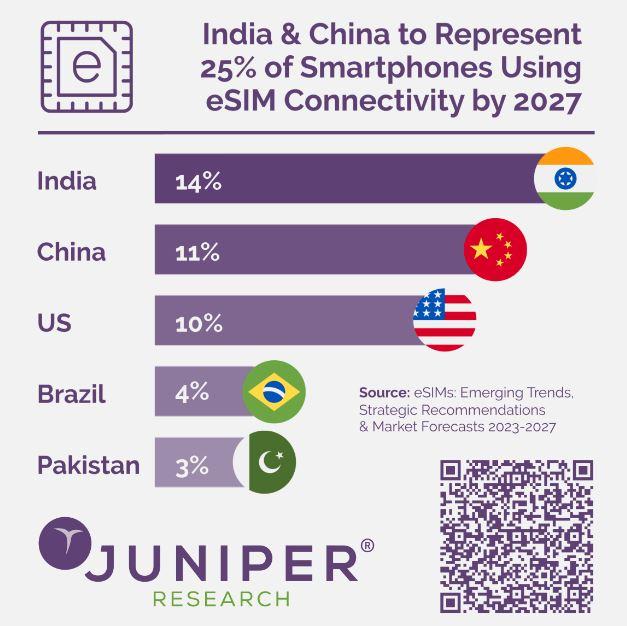Juniper Research is bullish about the eSIM market, so much so that it’s forecasting the global market will increase from $4.7 billion in 2023 to $16.3 billion by 2027.
Of course, the big instigator of all this is Apple, which released the eSIM-only iPhone 14 last fall, triggering all kinds of operator support. Apple had already supported eSIM via dual SIM, but with the iPhone 14, there’s no physical SIM card slot whatsoever.
eSIMs allow devices to seamlessly switch between network operators much more easily, which explains why some operators were less than enthusiastic about supporting something that makes it easier for customers to switch providers.
Last September, Counterpoint Research analyst Ankit Malhotra said Apple is leading the way in eSIM popularity even though Google started it all when it launched the Pixel 2 with eSIM support in 2017. At the time, Malhotra counted 14 OEMs as having launched eSIM-capable devices, including Samsung and Motorola.
Juniper Research said it expects Apple to expand deployment of eSIM-only devices to Europe this year.
“Despite operator concerns regarding the disruptive impact of eSIMs on existing business models, growing support from smartphone manufacturers will place additional pressure on operators,” said Juniper report author Scarlett Woodford in a statement. “In response, service providers must support eSIM connectivity to avoid subscriber attrition as technology awareness increases.”
Juniper’s report found that the total number of smartphones leveraging eSIM connectivity will increase from 986 million in 2023 to 3.5 billion by 2027, with manufacturers such as Google and Samsung developing an equivalent eSIM-only Android device in order to compete with Apple and maintain their global market positioning.
The report also found that the total number of eSIM-connected smartphones in China will increase from 103 million in 2023 to 385 million by 2027, assuming country-specific standards are implemented allowing eSIM use in smartphones.

Juniper noted that current regulations prevent Chinese-based device manufacturers from selling to their home market. In response, the report urges industry bodies to work closely with the Chinese government to develop specifications that allow eSIM support while addressing requirements for device monitoring and tracking.